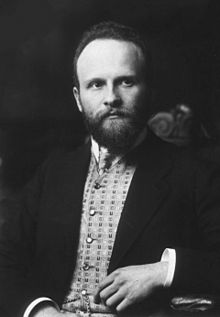Robert Bárány
Róbert Bárány | |
|---|---|
 Robert Bárány | |
| Born | 22 April 1876 |
| Died | 8 April 1936 (aged 59) |
| Nationality | Austro-Hungarian Sweden |
| Alma mater | Vienna University |
| Awards | Nobel Prize in Physiology or Medicine (1914) |
| Scientific career | |
| Fields | Medicine |
| Institutions | Uppsala University |
Róbert Bárány (22 April 1876 – 8 April 1936) was an Austro-Hungarian otologist.[1][2] He received the 1914 Nobel Prize in Physiology or Medicine for his work on the physiology and pathology of the vestibular apparatus.[3]
Life and career
Bárány was born in Vienna, Austria-Hungary. He was the eldest of six children of the former Maria Hock, the daughter of a scientist, and Ignác Bárány, born 1842 in Várpalota, who was a bank official and estate manager.[4] His parents were Hungarian Jews.
He attended medical school at Vienna University, graduating in 1900. As a doctor in Vienna, Bárány was syringing fluid into the external auditory canal of a patient to relieve the patient's dizzy spells. The patient experienced vertigo and nystagmus (involuntary eye movement) when Bárány injected fluid that was too cold. In response, Bárány warmed the fluid for the patient and the patient experienced nystagmus in the opposite direction. Bárány theorized that the endolymph was sinking when it was cool and rising when it was warm, and thus the direction of flow of the endolymph was providing the proprioceptive signal to the vestibular organ. He followed up on this observation with a series of experiments on what he called the caloric reaction. The research resulting from his observations made surgical treatment of vestibular organ diseases possible. Bárány also investigated other aspects of equilibrium control, including the function of the cerebellum.
He served with the Austrian army during World War I as a civilian surgeon and was captured by the Russian Army. When his Nobel Prize was awarded in 1914, Bárány was in a Russian prisoner of war camp. In response to his receiving the prize, Sigmund Freud wrote in 1915: "The granting of the Nobel Prize to Bárány, whom I refused to take as a pupil some years ago because he seemed to be too abnormal, has aroused sad thoughts about how helpless an individual is about gaining the respect of the crowd."[5] Bárány was released from the prisoner of war camp in 1916 following diplomatic negotiations with Russia conducted by Prince Carl of Sweden and the Red Cross. He was then able to attend the Nobel Prize awards ceremony in 1916, where he was awarded his prize. Virtually as soon as he was awarded the Nobel Prize, in January 1917, he, with the automatic qualification for making such proposals that comes with being a Prize Winner, proposed to the Nobel Committee in Physiology or Medicine that Sigmund Freud should be awarded the Prize.[6] From 1917 until his death he was professor at Uppsala University Faculty of Medicine.
Bárány died shortly before his sixtieth birthday in Uppsala. He was the father of physician and Swedish Royal Academy of Sciences member Ernst Bárány (1910–1991) and grandfather of physicist Anders Bárány, former secretary of the Nobel Committee for Physics.
See also
- Bárány chair
- List of Austrian scientists
- List of famous Austrians
- List of famous Hungarians
- List of Jewish Nobel laureates
- Spatial disorientation
- Instrument flight
- Instrument rating
References
- ^ Robert Bárány. (2009). In Encyclopædia Britannica.
- ^ Fred Ashley White (2009). Physical Signs in Medicine and Surgery: An Atlas of Rare, Lost and Forgotten Physical Signs. Museum Press Books. p. 37. ISBN 978-1-4415-0828-7.
- ^ Eastern Europe: an introduction to the people, lands, and culture Volume 1 – Page 394 Richard C. Frucht – 2005 " Hungarian or Hungarian-Born Winners of the Nobel Prize The physicist Fülöp Lénárd was the recipient of the Nobel Prize in 1905 for his work on cathode rays. Róbert Bárány received the 1914 Nobel Prize in Physiology and Medicine "
- ^ Visual Education Corporation (1987). Nobel prize winners: an H.W. Wilson biographical dictionary. H.W. Wilson. ISBN 978-0-8242-0756-4.
- ^ Ernest Jones (Ed.) (1961). "23: The War Years". The Life and Work of Sigmund Freud. Basic Books. p. 347.
- ^ Carl-Magnus Stolt (2002) "Why did Freud never receive the Nobel Prize?" in: Elisabeth Crawford (ed.) Historical Studies in the Nobel Archives. The Prizes in Science and Medicine, Uppsala: Universal Academy Press. pp. 95–106
Sources
- Nobel Lectures, Physiology or Medicine 1901–1921. Amsterdam: Elsevier Publishing Company. 1967.
External links
- Robert Bárány – Biography at Nobelprize.org
- 1876 births
- 1936 deaths
- Scientists from Vienna
- Austrian Jews
- Austrian neuroscientists
- Austrian physicians
- History of neuroscience
- Hungarian Nobel laureates
- Austro-Hungarian Nobel laureates
- Hungarian emigrants to Sweden
- Hungarian Jews
- Jewish physicians
- Jewish scientists
- Swedish Jews
- Swedish physicians
- Nobel laureates in Physiology or Medicine
- Uppsala University faculty

